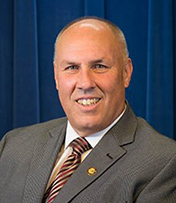—By Peter Skoner
The School of STEAM at Saint Francis University had 34 prospective students scheduled to attend its annual Accepted Student Day that was scheduled for Friday, March 13, 2020. This is a very important date in the annual recruitment cycle, a day when accepted students hopefully choose to pay their deposit and deposited students hopefully decide that they will attend the institution. The chance to meet faculty and students, hear about programs and activities, tour campus, and meet other prospective students usually results in a high yield to build the incoming first-year class. With schedules and reservations complete, the event was canceled on Thursday, March 12, as the announcement was made that on-campus classes were being suspended after that Friday because of the COVID-19 pandemic. Classes would continue in an online format the following Wednesday, leaving faculty two days to prepare.
The STEAM Leadership Council was scheduled to meet on Tuesday, March 17, and most of us were on campus. Sensing that our small, high-touch campus environment was going to change quickly, we held our meeting using Google Hangouts while sitting in our offices on campus. It was the first virtual conference meeting for most of us, and the first I was leading. After learning together in that hour meeting to mute microphones when not speaking, adjust our devices and cameras to provide a professional background, and use the chat to hold parallel discussions that complement the verbal conversations, we quickly saw the power of technology tools.
Fast forward two full months since that last day any of us were on campus: we are now 7 academic departments with 56 full-time faculty who are comfortable with virtual conference meetings beyond the basic level. The School of STEAM Leadership Council, consisting of department chairs and program directors, have all been holding their own online meetings. Individual faculty were using the technology to schedule meetings with students in their online classes, to complement the synchronous tools within the Canvas learning management system.
Two Virtual STEAM Days with a total of 36 prospective students participating were held to replace the on-campus experience. Logging into a two-hour Zoom meeting from home for the prospective student replaced missing a day of high school, driving several hours, and sitting through six hours of meetings on campus. By then, we knew how to choose virtual backgrounds that showed our mission and personalities, share and present a slideshow as if we were all sitting in one room, use chat to share messages with the entire group and private chat to welcome and engage individual students, use breakout rooms to allow more focused discussions and personal interactions, and use a Google Form survey to collect feedback more efficiently than paper forms in the old modality.
Since that first Zoom meeting for the School of STEAM, we are now regular users of video conferencing for connecting with prospective students and alumni. We realize the power of augmenting the high-touch, personal conversations with technology tools. As an example, we hosted an alumna from her hospital in Minnesota to discuss medical pharmacology with prospective students, current students, and faculty. A Discover Engineering meeting brought together prospective students, current students, alumni, and faculty. Scheduling is easier, meetings are more convenient and personal, and the geographic reach is much larger using technology.
Who knows where this will lead us. The pandemic might persist and leave us no choice but to continue teleconference meetings. Or we all might be on the same campus and realize we can actually be more productive, personal, and efficient by meeting virtually rather than in a conference room. While this observation is from the viewpoint of an academic administrator connecting with prospective students and direct reports, there are parallel lessons in teaching and learning we have discovered throughout this pandemic. Some might view the changes brought to higher education by the pandemic as negative; however, at Saint Francis University we see that technology has enabled us to continue to do our jobs, perhaps even better.
Peter Skoner is Interim Dean of the School of STEAM and Professor of Physics at Saint Francis University in Loretto, Pennsylvania.
This is the eleventh piece in COVID (Re)Collections, a series exploring responses to the COVID-19 pandemic by library, cultural heritage, and information professionals. Stories are proposed by the authors/contributors and reflect their personal experiences and perspectives at the time of submission. Learn more about the series and share your own story here.


